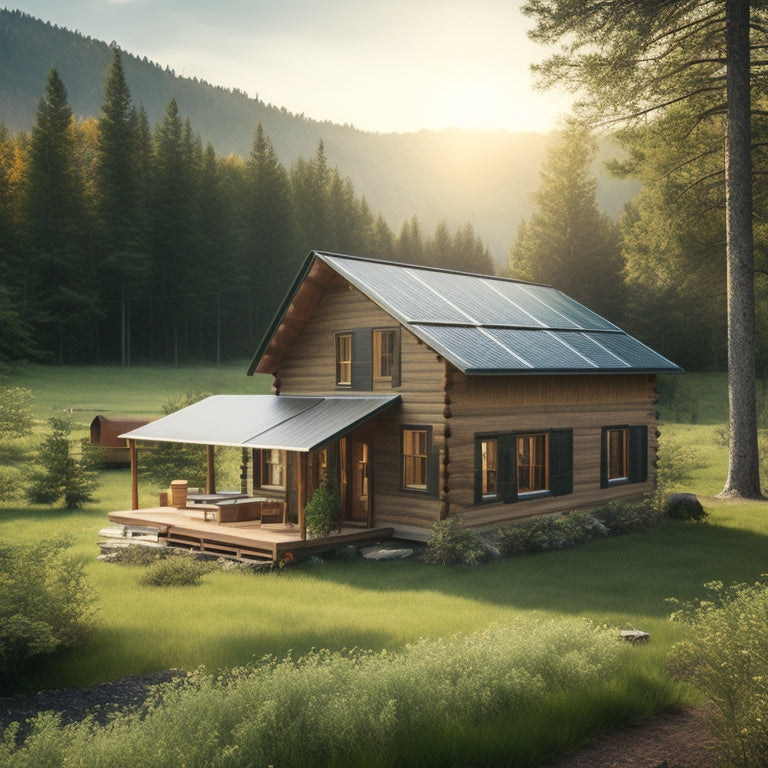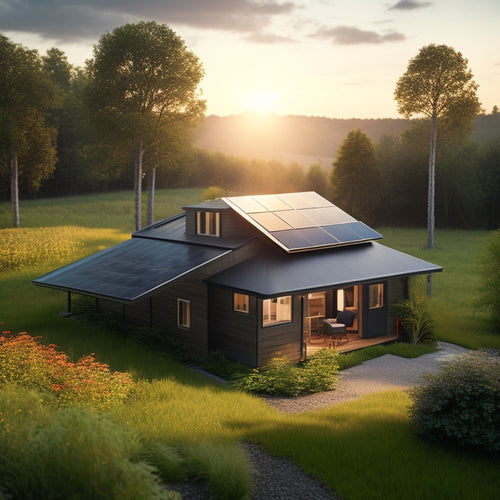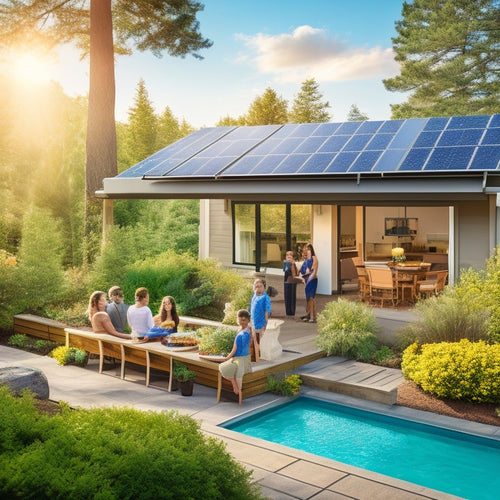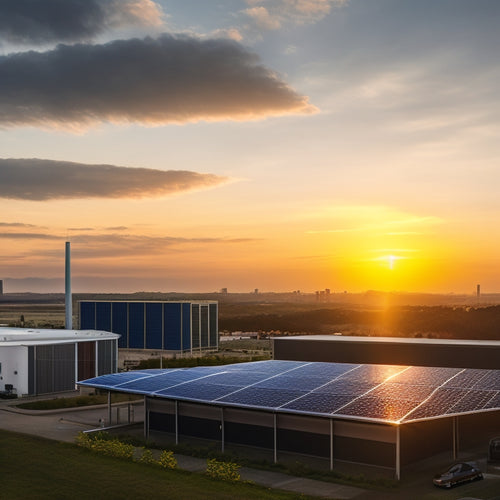
7 Best Solar Panel Systems for Off-Grid Living
Share
You're contemplating off-grid living with solar power as a reliable and sustainable solution. To achieve energy independence, you'll need a thorough guide to choose the best solar panel system. Look for top-rated off-grid solar kits with high-efficiency panels, portable power stations, and renewable energy solutions for remote homes. Bestselling solar panel packages cater to different energy needs and budgets. You'll also need to take into account DIY installation, component compatibility, and long-lasting battery solutions. As you explore your options, you'll want to assess these factors to find the perfect system for your off-grid lifestyle - and uncover the perfect solution for your specific needs.
Key Takeaways
• Consider high-efficiency solar panels with efficiencies above 20% for maximum energy generation per unit area.
• Choose a system with compatible components, ensuring seamless integration and avoiding incompatibility risks.
• Prioritize energy independence and sustainable power sources, reducing reliance on fossil fuels and traditional energy sources.
• Select a scalable system that can be expanded as energy needs grow, ensuring long-term sustainability.
• Consider a DIY off-grid solar system, but ensure careful planning, component selection, and proper wiring for safe operation.
Top-Rated Off-Grid Solar Kits
When venturing off the grid, you'll want top-rated solar kits that can efficiently harness the sun's energy to power your remote lifestyle. A key consideration is a kit comparison to determine the best fit for your needs.
Look for kits that integrate seamlessly with your existing system, ensuring a smooth shift to off-grid living. A well-designed kit will include high-quality components, such as durable solar panels, a reliable charge controller, and a deep cycle battery.
When evaluating kits, consider factors like system integration, compatibility, and scalability. Can the kit be easily expanded or modified as your energy needs change? Does it integrate with existing infrastructure, such as wind or hydro power systems?
A thorough kit comparison will help you identify the most efficient and cost-effective solution for your off-grid lifestyle. By prioritizing system integration and compatibility, you'll be able to maximize your energy independence and enjoy a reliable, sustainable power source.
High-Efficiency Panel Systems
Opting for high-efficiency panel systems allows you to generate more power per unit area, making them ideal for off-grid living where space is often limited. These systems typically feature advanced solar panels with higher efficiencies, often above 20%. This means you'll get more energy yield from the same surface area, making the most of your available space.
When choosing high-efficiency panel systems, consider the panel durability as well. Look for panels with robust frames, tempered glass, and durable connectors to guarantee your system withstands harsh environmental conditions. A durable system will provide a higher energy yield over its lifespan, making it a worthwhile investment.
High-efficiency panel systems are particularly beneficial for off-grid living, where energy independence is important. By maximizing your energy yield, you'll reduce your reliance on fossil fuels and minimize your carbon footprint.
With the latest advancements in solar technology, you can expect high-efficiency panel systems to provide a reliable and sustainable source of energy for your off-grid lifestyle.
Portable Power Station Solutions
When you're living off the grid, you need power that's as mobile as you are. That's where portable power station solutions come in - they're designed to provide reliable energy on-the-go.
With options like compact energy storage and power-on-the-go solutions, you'll never be without the energy you need, wherever your off-grid adventures take you.
Power On-The-Go Options
You can stay powered up on the move with portable power station solutions, which offer a convenient and reliable way to keep your devices charged when venturing off the grid. These solutions are designed to provide power on-the-go, making them perfect for outdoor enthusiasts, remote workers, and anyone who needs to stay connected in remote areas.
One popular option is solar backpacks, which integrate solar panels into the backpack itself, allowing you to generate power while you're on the move. These backpacks are perfect for hikers, campers, and festival-goers who need to keep their devices charged.
Another option is mobile chargers, which are compact and lightweight, making them easy to carry around. These chargers can be powered by solar panels or battery packs, providing a reliable source of power in remote areas.
With portable power station solutions, you can stay connected and powered up, no matter where your adventures take you.
Compact Energy Storage
In addition to harnessing power on-the-go, compact energy storage solutions, also known as portable power stations, play an essential role in off-grid living by providing a reliable and efficient way to store and utilize electrical energy.
These innovative solutions enable you to store excess energy generated by your solar panel system, allowing you to use it when you need it most.
When selecting a compact energy storage solution, consider the following key factors:
-
Energy density: Look for solutions with high energy density, which allows for more power in a smaller package.
-
Battery management: Confirm the system has advanced battery management systems to optimize performance, safety, and lifespan.
-
Capacity: Choose a solution that meets your energy needs, from small devices to large appliances.
- Portability: Take into account the weight, size, and durability of the system, ensuring it can withstand off-grid conditions.
Renewable Energy for Remote Homes
Remote homes often rely on renewable energy systems to power their daily lives, and solar panel systems have emerged as a viable option for meeting their energy needs. As you consider off-grid living, you'll want to prioritize energy independence, and solar power can help you achieve that. By harnessing the sun's energy, you can reduce your reliance on traditional energy sources and enjoy rural electrification.
In areas prone to wildfires, solar panels can provide wildfire resilience by reducing your dependence on grid power. Additionally, with climate adaptation in mind, solar energy can help mitigate your carbon footprint. Furthermore, solar panels can facilitate remote connectivity, allowing you to stay connected with the world even in the most secluded locations.
When it comes to off-grid living, solar power offers a reliable and sustainable solution. By incorporating solar panels into your energy system, you can enjoy the freedom and autonomy that comes with living off the grid.
Bestselling Solar Panel Packages
Four popular solar panel packages dominate the market, offering a range of benefits and features tailored to specific off-grid living needs. Whether you're a seasoned off-gridder or just starting out, these packages can help you achieve energy independence and significant Solar Savings.
Here are some of the top-selling packages:
-
Starter Kit: Ideal for small cabins or tiny homes, this package includes 2-3 solar panels, a charge controller, and a battery bank.
-
Off-Grid Essentials: Suitable for larger homes, this package features 4-6 solar panels, a high-capacity charge controller, and a deep cycle battery bank.
-
Solar Expansion: Designed for existing off-grid systems, this package adds 2-4 solar panels and a compatible charge controller to increase energy production.
- Premium Package: The ultimate off-grid solution, this package includes 8-10 solar panels, a high-efficiency inverter, and a large battery bank for maximum energy independence.
When choosing a package deal, consider your energy needs, budget, and available roof space. By selecting the right package, you can enjoy the benefits of off-grid living while maximizing your Solar Savings.
DIY Off-Grid Solar Systems
As you begin constructing your DIY off-grid solar system, you'll need to contemplate several vital factors to guarantee a successful installation.
You'll have to design a system that meets your energy needs, select components that work seamlessly together, and wire and install them correctly.
System Design Considerations
When designing a DIY off-grid solar system, you must carefully balance your energy needs with the available solar resources to guarantee a reliable and efficient power supply. This requires careful consideration of several factors to make sure your system meets your energy demands.
To guarantee a well-designed system, consider the following key factors:
-
Load Calculations: Calculate your total energy requirements by summing the power consumption of all your appliances and devices.
-
Climate Factors: Assess the amount of sunlight your location receives throughout the year, taking into account factors like shading, temperature, and humidity.
-
Battery Sizing: Determine the ideal battery capacity to store excess energy generated during the day for use at night or during periods of low sunlight.
- System Monitoring: Plan for a monitoring system to track your energy production, consumption, and storage, ensuring you can detect and address any issues promptly.
Component Compatibility Issues
Incompatibility between components can silently sabotage your DIY off-grid solar system, causing inefficiencies, damage, or even complete system failure, making it important to guarantee seamless integration of all components.
You might've chosen the best solar panels, batteries, and inverters, but if they're not compatible, your system will underperform or fail altogether. To avoid these technical hurdles, you need to make sure that each component is designed to work harmoniously with the others. This is where system integration becomes vital.
You'll need to take into account factors like voltage, current, and power ratings to ensure that each component can handle the demands of the others. Additionally, you should verify that the components are compatible regarding communication protocols and data transmission. By doing so, you'll overcome the technical hurdles that can hinder your system's performance.
Wiring and Installation
You'll need to carefully plan and execute the wiring and installation of your DIY off-grid solar system to guarantee safe, efficient, and reliable operation. A well-designed wiring system ensures that your solar panels, batteries, and other components work harmoniously together.
When it comes to wiring, cable management is vital. You'll need to secure cables to prevent damage and make sure they're protected from environmental elements. A well-organized cable system also facilitates maintenance and troubleshooting.
Here are some essential considerations for your DIY off-grid solar system's wiring and installation:
-
Grounding systems: Make sure your system is properly grounded to prevent electrical shock and ensure safe operation.
-
Use the correct gauge wire to minimize energy losses and prevent overheating.
-
Install a surge protector to safeguard your system from power surges and spikes.
- Consider hiring a professional if you're not comfortable with electrical work to guarantee a safe and reliable installation.
Long-Lasting Battery Solutions
Your off-grid solar panel system relies on a dependable battery bank to store excess energy generated during the day for use at night or during periods of low sunlight, making long-lasting battery solutions a critical component of your overall system.
When selecting batteries, you should prioritize deep cycle batteries designed specifically for off-grid systems. These batteries are built to withstand the rigors of daily charge and discharge cycles, ensuring a longer lifespan.
Proper battery maintenance is also important to extend the life of your batteries. Regularly check the water levels, clean the terminals, and make sure the batteries are stored in a well-ventilated area. Equalization charges can also help maintain the health of your batteries.
Frequently Asked Questions
Can I Install Off-Grid Solar Panels Myself or Do I Need a Professional?
While you can attempt a DIY off-grid solar panel installation, beware of DIY risks like electrical shock and improper system sizing; instead, consider hiring a professional to guarantee a safe and efficient setup, reaping benefits like warranty validation and optimized energy harvest.
How Do I Determine the Right Solar Panel System Size for My Needs?
As you navigate the uncharted territory of off-grid living, you're like a shipwrecked sailor searching for a beacon of light. To determine the right solar panel system size, you'll need to chart a course through a load calculation, energy audit, and system design to identify your power requirement.
Are Off-Grid Solar Panels Compatible With Existing Electrical Systems?
You'll need to verify that your off-grid solar panels are compatible with your existing electrical system, checking for grid connection requirements and inverter compatibility to guarantee seamless integration and efficient energy harvesting.
Can I Use Off-Grid Solar Panels to Charge My Electric Vehicle?
Did you know 80% of EV owners charge at home? You can use off-grid solar panels to charge your electric vehicle, but consider your Vehicle Range and Charging Time: a typical 30kWh battery takes 4-6 hours to fully charge with a 7.2kW solar array.
Do Off-Grid Solar Panels Work Efficiently in Low-Light Conditions?
You'll find that off-grid solar panels can still generate power in low-light conditions, albeit with reduced efficiency; on a cloudy day, expect around 10-20% of the system's peak output, depending on the panel's Low Light Performance.
Related Posts
-

Diy Off Grid Solar
By embracing DIY off-grid solar, you can break free from grid dependence, slashing your energy bills by up to 90% and...
-

Top-Rated Home Solar Power Kits for Achieving Energy Independence
Top-rated home solar power kits enable you to achieve energy independence by greatly cutting your energy costs. You c...
-

Advantages of Commercial Solar Battery On-Site Storage
By investing in a commercial solar battery on-site storage system, you can greatly reduce your energy grid dependence...


